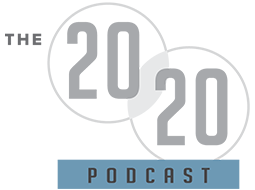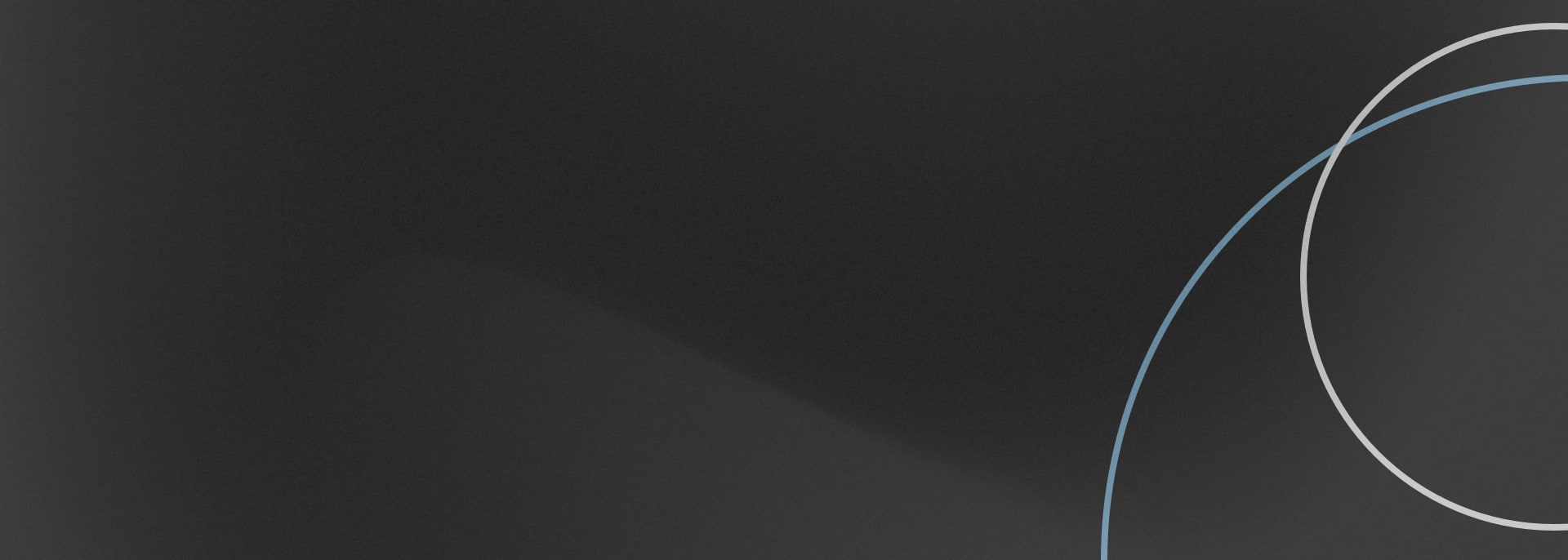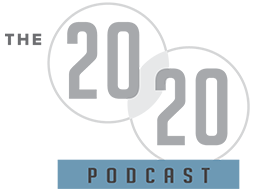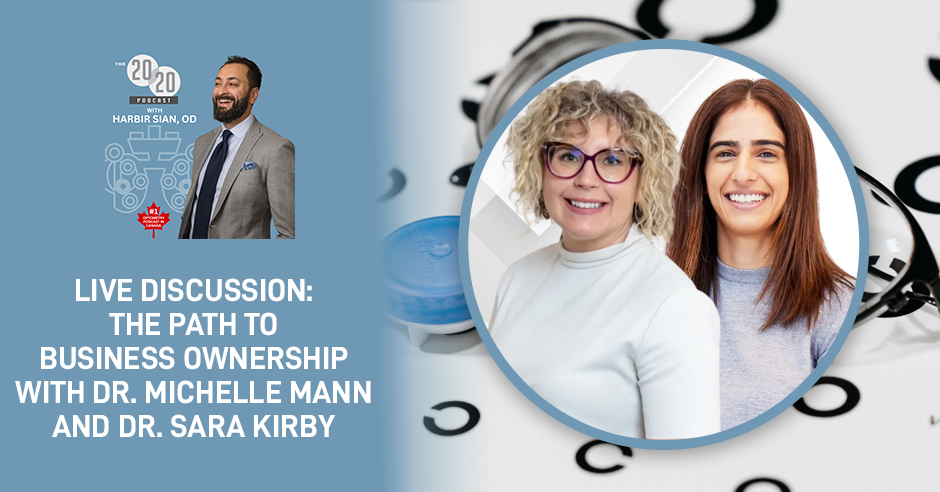
Business ownership in optometry can feel like a leap of faith—but it’s also one of the most rewarding paths a new graduate can take. In this live event, Dr. Michelle Mann and Dr. Sara Kirby share their contrasting journeys—one building a cold-start practice from the ground up, the other buying into an established clinic—and reveal the real-world lessons behind financing, staffing, equipment investment, adaptability, and finding joy in the process. Their insights demystify practice ownership, showing how passion, preparation, and the right partnerships can help you build a thriving business and a fulfilling career.
Connect with Harbir:
—
Watch the episode here
Listen to the podcast here
Live Discussion: The Path To Business Ownership – Dr. Michelle Mann And Dr. Sara Kirby
Thank you so much, as always, for taking the time to join me here. I wanted to do a very quick intro here. The next couple of episodes are two very special episodes that we recorded a few months ago. You may have heard me talking about this on social media and that type of thing, where we were doing live-recorded shows in front of an audience. In particular, a new grad audience.
The content is going to be relatable to any optometrist, student, new grad, veteran OD, or whatever stage of your career you might be at. We had two interviews that we recorded. I would highly encourage you to check these out on YouTube because the video is beautiful. The venue is beautiful. Everything turned out so well.
This is part 1 of the 2-part series of interviews that we did for this new grad live event. The first interview is regarding business ownership. We talk about starting cold versus buying into an existing practice. The second part is going to be about getting into specialty care and, in particular, dry eye or myopia management, but how we become a bit of an expert and develop our expertise in any particular space. It could be any space you might want to get into.
After the episode is done, stay tuned because we did a little live Q&A with the audience, and some of the questions were great. It’s short. It’s only 6 or 8 minutes after each episode. We had great questions from the audience that will be relevant to everybody who’s reading. This is part one of this live new grad event that we did. Part one is about business ownership. I hope you guys love it. Enjoy it.
‐‐‐
Thank you so much for taking the time to join me here. We have a couple of very special episodes. We are doing this amazing live event with a live audience. We’re at The Kent in Downtown Vancouver. This is the first time ever that I’ve done a live interview in front of an audience. We’ve recorded like this at different events and whatnot. We are here to do a live event.
Before we even get started, I want to make sure that we say a huge thank you to the people who have helped make this happen. This is like a dream come true for me. Honestly, I had this vision. I called up my amazing rep, Paula, at Thea and said, “I have this vision. What do you think?” Thea has been so incredibly supportive. The whole team, Paula, KP, Melissa, Mike Berg, and everybody at Thea, thank you so much for working with me, doing all the logistics, and bringing this together. Also, our amazing sponsors, Essilor Canada and Portfolio Planning, we couldn’t do it without you. Thank you so much for all your support.
This is the 1st of 2 interviews that we’re going to do. We have two separate episodes. In the first one we’re doing, our audience is all new-ish grads, although all the content we’re going to share in these interviews is going to be valuable to anybody who tunes in. Our first interview is going to be about business ownership and how to get into business ownership. I have two amazing guests who are going to help us with this conversation.
We have Dr. Sara Kirby, who is a Partner in Tsawwassen Optometry in Tsawwassen. This is an important distinction. Sara bought into Tsawwassen Optometry in 2014. She’s been a partner in that practice for over ten years. It’s a big, busy practice. They have 3 doctors and at least 10 or more staff. There is a lot going on there. She’s going to share her perspective on what it was like to jump into a busy practice. Also, this is very important. Sara is a mother of three beautiful children. We know that it is a full-time job on its own. Please welcome Dr. Sara Kirby.
Thank you so much for having me. This is exciting.
We also have Dr. Michelle Mann, who is the Owner of Mishe Optometry in Surrey. Michelle graduated from NCPHS in 2018. She opened Mishe as a cold start practice in 2022. She has this beautiful modern practice in Surrey. We’re going to hear from Michelle and her thoughts on what it was like to start a cold practice. Thank you for being here, Michelle.
Thank you. This is like an Oprah moment for me. I appreciate it.
The Entrepreneurial Spark: When Did Business Ownership Call?
Thanks for the compliment. I appreciate that. Let’s jump in. I’m going to ask each of you a question. I’m going to take a moment to hear each of your thoughts. For the first question I have, our audience here is primarily new grads, and they’re starting to decide what journey they want to go on in their career. At what stage of your career did you decide that business ownership was for you? Why don’t we start with Sara?
Coming out of school, I knew I wanted to go into private practice. I also knew I wanted to be in a smaller community. I had a few different job opportunities. Some were a little bit more corporate, and some were a little more private practice. I walked into the clinic I’m at, and it felt right. It felt so good. It was a very warm, welcoming, older practice that was well-established.
On my first day, when I was in the clinic, I went to Dr. Joan Hansen, who was the original owner. She took me to her house for lunch. Right away, I was like, “This feels good.” I started working as an associate and thought eventually that I’d like to buy in. The opportunity naturally went that way. I’ve only worked in one practice.
As far as being a business owner, was that from day one when you graduated optometry school that you knew that was what you wanted to do?
I did. I thought that was the way I wanted to go. It was not right away. I knew I had a lot to learn and a lot to work through first. I was leaning towards owning my own private practice, for sure.
Michelle, how about you? When did you decide?
At a very early age, I knew I wanted to have my own practice. After graduating, I wanted to take more of Sara’s journey, to be honest. I wanted to work at a private practice, and then, eventually, if the owner retired, I would take over. That did not happen for me that way because when I graduated, I worked various practices to see which avenue I wanted to pursue. Then, COVID happened.
COVID was an interesting time, although very traumatic for most. It was a time for reflection of, “I can continue to work at all these different practices in perhaps corporate or private.” Ultimately, I knew that I wanted to own my own, and might as well do it. An opportunity always presents itself. When opportunities like that come by, you have to take them. I always find that’s a sign from the universe telling you, “You’ve got to go and go for it.” It was challenging. I was a couple of years in deep with the experience. To open up something cold start was crazy, I’m sure, but rewarding. It was heartbreaking at times, but it was all worth it.
When opportunities come by, you have to take it because that’s a sign from the Universe telling you to go for it.
Buying In Vs. Cold Start: Unpacking The Ownership Journey
That’s pretty early in your career to do that. From my own experience, I know cold start has its challenges. They both have their challenges. That’s what I want to ask you next. Sara, I’ll come back to you. It sounds simple when you think, “I’m going to buy into this practice,” but what is involved in that process, as much as you’re able to share with us? Let’s say our colleagues here are working in a practice that they think there’s an opportunity to buy into. What are they looking at financially and logistically? What else has to go into that process?
Ultimately, you want to find a practice that you’re comfortable with. You want to find a community that you’re comfortable with and patients that you can work with. That’s key. The practice that I eventually partnered into was an older, established practice. We had a lot of patients. I still see patients who have been coming to see us since 1983, when we opened.
We had the patients, but it was an older clinic. That does have some challenges itself. The staff who have been there forever and ever are an amazing team, but you have to come in with the approach of, “This practice is the way it is. I have to join this practice. I have to take some of my ideas that I may want to do, but I also have to work with a team that is already there.”
I was very lucky to have two partners. The way that we designed the buy-in was that I bought in over five years, which was so great. I have one partner who was a partner of mine from the beginning, and then the other doctor, the original owner, who has been a big influence in the optometry world. She has been such an incredible mentor to me. Through the buy-in process, she helped lead the way and give us guidance. Buying in over a longer period of time financially was easier, too. It wasn’t just one lump to take. I had the opportunity to, over five years, gradually purchase that.
I know sometimes speaking about finances is a little uncomfortable, and we don’t want to overshare, but in this setting, it’s valuable. Is it that you are paying a set amount of money every five years, or is it possible that some of the revenue generated goes towards you buying in? How does that usually look?
That’s the way that we did it. I paid a lump sum every year, and then I took very little money when I was buying in, which went to help pay for the practice.
Building From Scratch: The Cold Start Playbook
Thank you. Michelle, this is a very different story for you, starting cold. What did that look like as far as how you scout out the location and sort out finances, bank loans, and things like that?
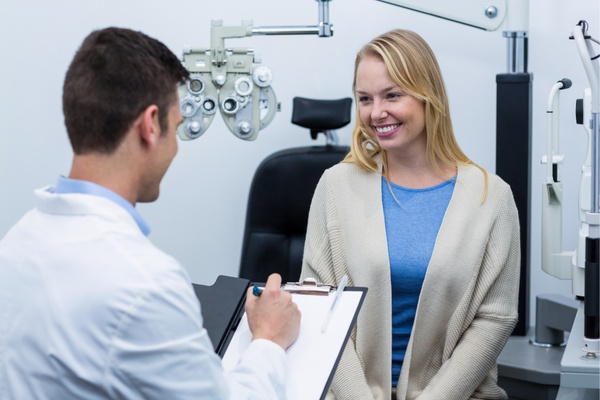
For the location, I grew up in Surrey. I wasn’t tied to Surrey, but Surrey is a growing community. Especially in that location, specifically, there’s a SkyTrain coming through. There was a lot of potential. You’ll see new developments. If there’s commercial, you’re going to see a dentist, a physical therapist, or a doctor. The dentist bought in first. There was a medical clinic, a coffee shop, and then one sitting empty there. In talking to my colleagues or even advisors that I look up to, they said, “You’d be silly not to buy. You can work with all these different medical professions.”
The real estate aspect, too, is what people forget. I have my business, but I also own the unit. It made sense there. Then, it’s finding a team. The team consists of a good accountant you trust and a banker. You have to shop around at different banks. Most bankers do like medical professions, to some extent, because they know that they’ll be able to make it back in some capacity.
I’m an RBC girl, so that’s the first person I went to. They were very good, accommodating, and flexible while working with me. It’s a lot of overhead on my part. I had to be strategic about what I wanted in the clinic. That stuff comes in a little later. It’s finding a good bank, finding a good lawyer, and finding a good accountant. Those are the three cores that you’re specifically going to deal with a lot in cold start.
Some of you were at that BCDO new grad thing that was happening during the conference. I was sitting down with a lawyer. Her name was Elaine. We were talking about that. They’re so valuable, the accountant, lawyer, and financial planner. Did you see somebody else?
A banker.
A banker and then a financial planner, like Tyson in Portfolio Planning, help you get your ducks in a row and start to figure this out. It seems like a lot. The fees for these professionals seem like a lot, too, but in the long-term, it’s invaluable. I remember a couple of years back, we were chatting as you were getting started up. You made a note or mentioned equipment and stuff like that. A lot of the time, you have to make a decision between one thing and another. I know that was some of the conversations we were having. How did you make some of those bigger capital investment-type decisions? What came first for you? How did you decide to push something else to the back burner?

I realized I was going to be at this clinic every day, so I wanted equipment or the design of something when I walked in, like, “I’m happy to be there,” and longevity. Also, it was asking the questions of people who use the equipment. I went to Harbir and was like, “I’m thinking of buying an Opto. Should I buy it?” I was asking other individuals as well. Ultimately, I knew that if I cheaped out or cut corners, I would be frustrated down the road. Ultimately, time is money. Any piece of equipment or software that’s going to improve efficiency in patient care was number one for me.
I love that. Did you buy the Optomet?
I did. Thank you for your recommendation. I didn’t get a discount, but thank you.
Beyond The Chair: Is Business Ownership Right For You?
I also didn’t get any kickback from Optomet. I had nothing from that discussion. I’m going to rewind a little bit in the conversation. Both of you had a decision made from the beginning of, “I want to be a business owner.” You had different journeys and whatnot. For our colleagues here who are maybe not sure yet, what could you suggest? What advice might you give them as far as how they could figure that out for themselves? Sara, I’ll start with you again.
Owning your own practice is almost like having two separate ways that you operate. You have your patient care. Patient care is what we all went into this profession for. It’s so important. That’s why we’re doing it. If you enjoy the patient care aspect of it but want a little bit more, owning your own practice is so rewarding. You’re able to make those decisions and are able to decide what products we want to carry, what suppliers we want to work with, what reps we want to work with, and what new equipment we want to invest in. Having the ability to do that with private practice is great. It’s not easy, but once you have your mind set and you get everything laid out, you can do those things.
If you like the leadership aspect, the teamwork aspect, and the HR side of it, too, it’s super rewarding. If you like to have the ability to set goals, reach different milestones, and be able to grow in different ways, owning your practice is endless with what you can do that way. I ultimately love patient care. In school, you don’t do a lot of business. Coming out, it can be quite daunting. I was like, “How am I going to do this? I don’t know much.” Things happen along the way, but if that’s what you want to do, it is super fulfilling. Every day is different with every challenge that you approach. You can shape the practice that you want.
That’s good advice. One of the things that I did backwards, but I’m hearing more and more and have been, over time, evolving to be is business owner first and an optometrist second. Maybe not everybody will agree, but I find the people who are the most comfortable in the business ownership role are often business owners who happen to be optometrists. I was the other way around. I was an optometrist who became a business owner and had to figure that out. I wasn’t so comfortable with the numbers, the goal setting, the leadership, the HR, and all of that. That came for me over time with mistakes and all of that.
That’s something that I would echo. If you feel like you like that kind of stuff, that will give you a leg up. It doesn’t mean you can’t do it if you don’t love that stuff. If you don’t love it, then you have to make sure that you lean into learning more and more about that. For example, even at this stage of my career, I’m joining mastermind groups, coaching things, and stuff like that. I’m getting coaching on marketing or how to train my staff. Stuff like that is always ongoing. I needed it more because it was never a strong suit for me. A little thing. If you feel inside that you already are good at that kind of stuff, then that gives you a bit of an advantage if you want to get into ownership.
I went to Indigo and bought How to Run a Business for Dummies. I bought every single book. I’m similar to you. I’m an optometrist who happens to be a business owner. If you’re thinking about it, the best thing you can do is ask questions. Ask questions to those who may not be in business anymore. Do they like their lifestyle? Ask ones who are current business owners.
You guys are lucky because if you’re shy and you don’t want to knock on their door or call, you have Instagram. You have social media. It’s an easy message to be like, “I was thinking about it. Can you sit down and chat?” More often than not, people are willing to help because we have been in your shoes. If you’re ever curious about it, ask questions. It’s not for everyone. It is challenging. There’s a good work-life balance. Eventually, you can get there. I’m in the work part of the balance, and that’s normal with any cold start. That’s okay. You have to have that expectation.
If you’re ever curious about it, ask questions.
The Power Of Partnerships: Leveraging Industry Relationships
The balance is always shifting. You have to look at the work-life balance over a ten-year period, not weekly. Sara, you mentioned something earlier about talking to your reps, industry partnerships, and things like that. I wanted to ask each of you how important that has been as far as building your practice. How important have those relationships been for you?
Huge.
You can’t say they haven’t. We have sponsors. We love them. They’re amazing.
They are. It has been a huge help. Having reps that will come in, do a lunch-and-learn, and do training for your staff makes a big difference. We are putting time into it, but we don’t have to make a training program ourselves. They’re more than willing to come and talk to your team or take you out for lunch and talk about their new products. It’s a relationship where both the clinic and the company benefit from it. It’s a big thing. Also, understand those products that you want your patients to be using and that you want your patients to be in. It has to be something that you believe in. There are so many different choices out there. Being able to find the one that is going to best suit your patients and your clinic matters.
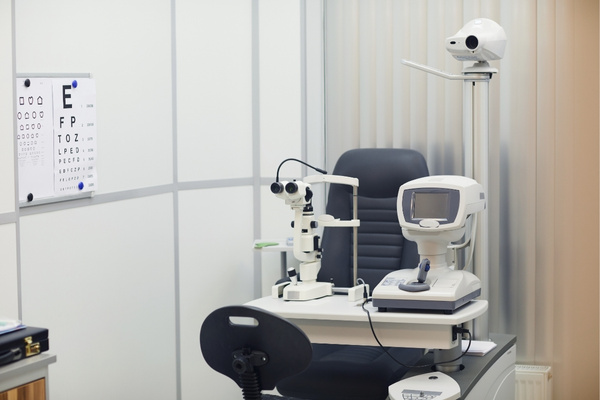
Michelle?
Industry reps are important. They played a pivotal role in my practice. Especially when you’re trying to look for staff, you could be, “Do you know anyone who would be willing or is looking for a change?” There were days I was sitting there, twiddling my thumbs, like, “Is there any clinic that needs a doc to cover?” Out of that, I ended up taking over a lane in North Vancouver, which became very lucrative for me. That was because through an industry rep. They played a huge part. Back to the training, you were thinking, “Do I have to come up with this training module? Where do I start?” They have that already there for you. Utilizing them and their skills is super important, especially when it comes to the structure of your clinic.
Thank you for sharing that. The answer was going to be a positive answer because we have them here, but it’s not just that. I will echo this. I’m probably going to say this again when I speak with Janice and Yang later as well. Not just the reps, but the industry partners as a whole and companies like Esslor and Portfolio Planning will support your career in ways that you don’t quite yet understand.
I say this all the time. I say it even when I give CE lectures. If I’m talking about myopia management or dry eye, the last slide I always have is me hugging one of my reps. I used to hide from my reps. When I was an associate, I would hide. I would close the door and say, “I’m busy.” The staff would come and say, “Your contact lens rep is here. Your dry eye rep is here,” and I’d be like, “I don’t care. I don’t want to meet with them.” I’ve realized how invaluable they are. You cannot put a number on how much value they bring to your practice and your career, even as associates.
Not all of them because they’re not all that nice, but I hug most of them. I end up leaving a patient waiting for ten minutes when Paula comes in because we chit-chat and catch up on stuff. To Michelle’s point, I ask them, “What’s happening out there?” If I’m trying to elevate dry eye, myopia, or something in contact lenses, I’ll ask the reps, “How are other people doing this? What did they do to be successful in this? What do you see in my practice that I could do better?” I don’t know how many practices they go to, but they gain so many insights from that.
Even early in your career, if you get an opportunity, I highly encourage that when you see a rep come in, see if you could take a minute and say hello. Introduce yourself. I knew from early on that I wanted to get into speaking and stuff like that. I specifically remember at an Alcon dinner, probably only a year or two into my career, that I would hound the Alcon rep anytime I went or I saw him or his manager. I’d be like, “If you have speaking opportunities, let me know. I’d love to talk about this and speak on this.”
Eventually, after hounding them enough, they gave me a chance to speak in front of opticians. That was my very first opportunity to speak to other eyecare professionals about something eyecare-related. It came from me telling them, “I’m interested in this.” Since then, I’ve done many, but it started from there.
If you find that you’re interested in some other aspect of the profession, talk to the reps. If you find that you want to learn more about business, talk to the reps. If you want to look for another job opportunity, talk to the reps. They will help you out in any way they can. They will go out of their way to do it. Let’s wrap this up with a couple of more quick questions here. What’s one thing you wish you knew about business ownership before you became a business owner that you didn’t know beforehand, and you learned after?
Unforeseen Realities: What I Wish I Knew About Ownership
For me, you graduate from school, and you’re so excited to get in there, practice, and see patients. You do that for a while, and then there’s an opportunity to buy in. That was the goal. It was, “I can own a practice. Little did I know that was just the beginning. It is constantly changing. I’m always learning and always growing. You set little goals. You think when you get there, you’re there, but as soon as you get there, you have a whole other set of goals and a whole other way that you want to grow and improve.
You want to make the practice better. You want to give your patients better care. You want new technology that’s going to help them. I didn’t realize how evolving it would be and how it would always be a continuous learning and growing process. You ask, “What can I do better? How can I do this better?” which is great. Going in, it was a little bit like, “This is how it is.”
That’s so true. I’ll let you go, Michelle. I probably have something to share there.
With business ownership, it’s an art form. You have to learn how to adapt and pivot, especially the finance and the number-crunching of it. Sometimes, you’re like, “I’m good at math. I’ll figure it out,” but it’s an art form. You’re accessing a different aspect of your brain. It’s challenging at times, but it keeps you on your toes, too, which I like. Some things don’t work. If there is a mistake, you don’t have time to dwell on it like, “This happened.” You’ve got to move. It makes you a good critical thinker as well. It not only develops my skills personally but professionally as well.
Business ownership is an art form. You have to learn how to adapt and pivot.
I love that. I love quotes. I’m a big quote guy. I like to share whenever I can. What you’re saying, Sara, reminded me of a quote. You didn’t ask me for a recommendation, but I’m giving you one anyway. If you’re ever looking for one amazing book to read, it is Nelson Mandela’s biography. If you haven’t read it, it’s a big, fat book because he did so many things in his life. It is life-changing, honestly.
I highly encourage you to read it, please, for your life. It will change so many things for you. At the very end of that book, the last thing he says is, “I’ve reached the top of this hill. I’ll rest here, but only for a short while because from this hill, I can see all the other hills I have to climb.” That’s what business ownership is. Like. You get to one level, and you’re like, “That was amazing, but there are so many other levels left.”
I know that there’s probably some Chinese proverb around that or something as well. His quote at the end of the book was so beautiful. That’s from somebody who has accomplished so much in his life. Even for us as optometrists and business owners, we’ll often feel that way. You’ve accomplished something, but there’s still so much more afterwards.
I decided I’m going to do this. I didn’t prep you for this. My following guests will be prepared. On the show, for the last little while, I’ve been doing this segment that I call You’re Welcome. For anybody who tunes in to the show, you’re familiar with it, but if you’re not, it’s easy. Don’t worry. You have kids, so you probably know the song You’re Welcome from Moana. Is it familiar? Do you know Moana? Do you know the song?
I don’t know the song.
Dwayne The Rock Johnson is the character. He sings a song. He’s this god-like figure. He has provided so much for everybody and is being egotistical, like, “You’re welcome.” This is your chance. I’ll give you a second because I didn’t prep you for this. I apologize. What I ask guests to do on the show is think of one piece of advice.
You’ve given so much advice and insight already, so I know you might have to think again. If you could think of one powerful, general life advice, a quote, or something that you feel has changed your life or your trajectory, what would that be? I’ll give you a second to think. When you’re ready, then we’ll do You’re Welcome. Are you ready? Do you think you know?
I think I do.
Let’s do You’re Welcome.
I have it on my mirror. I went to a yoga class, and they gave out these random words of affirmation cards. The card I got was, “Find joy in the ordinary.” That spoke to me because there’s a lot of ordinary in our day. You have to be able to enjoy it, take all those ordinary moments, and make them into something special.
There’s a lot of ordinary in our day; you really have to enjoy it. Take those ordinary moments and make them special.
That’s amazing. I love that. Especially as a parent, there’s so much routine. You have to lean into that. Thank you.
I’m a big quotes person, too, but all of them are escaping from my mind. Find the joy of being uncomfortable. If it’s too comfortable, it’s too easy. You’ve got to be uncomfortable. Find the joy in being uncomfortable because that’s how you evolve and become a better person. Being uncomfortable is what you should go for.
Thank you.
You’re welcome.
Thank you very much. Any final words? Anything we missed that you want to share? Either of you, both of you.
Find joy in being uncomfortable because that’s how you evolve and become a better person.
The Art Of Partnership: Choosing Your Business “Spouse”
I’ll say one. Michelle and I are on different ends of it. I have a partner. I know Michelle is the sole owner. That’s something else to consider as well if you are going into practice ownership. I remember in school, they said, “Your business partner is like your other spouse. You have to be comfortable with them.” It is so true. I have the best partner. We talk probably every day on the phone. We text back and forth. We are constantly in communication.
Something will happen, and I’m like, “I’ve got to call Julie. I got to call my partner.” That’s something where, if you like having someone else to bounce ideas off of and make decisions with, it’s great. If you’re someone who likes to make decisions on your own, you have to consider that when you’re going into a partnership, because you will be spending a lot of time with them. You’ll also be making some pretty big decisions with them, too.
That’s so true. As somebody who has a business partner as well, we’ve been business partners since we opened. It’s such a huge decision. It can be truly so helpful and powerful if you’re on the same page. My business partner is Dr. Harleen Takhar. I’m not sure if any of you know who she is, but we’ve been friends for a very long time, since high school. We went to different optometry schools, but I don’t know anybody else in optometry as well as I know Harleen.
This work wife thing comes into play when I’m sharing TMI things. You know what I mean. You get so close. You’re making investments and spending as much money as you would with a spouse in a lot of cases when it comes to your business. A business partnership can be super valuable, but you have to pick that person carefully. Michelle, anything we missed? Anything else you want to share?
I’m thankful for this opportunity. I’m grateful. If you guys honestly have any questions, please come and ask us. DM me. My Instagram is @MisheOptometry. I’m putting a plug there. Please, reach out.
Share, Sara, if you don’t mind, if anybody wants to reach out.

I don’t do social media well. [email protected] is our email address. I’m the same thing. I’m happy to help with any questions you have because there can be a lot of questions. It’s great to be able to talk to someone who has gone through these things, the good and the bad.
Thank you, guys. Thank you, Sara. Thank you, Michelle. Can I get a round of applause for our amazing guests, please? Thank you to our amazing partners, Thea Pharma, Essilor Canada, and Portfolio Planning, for supporting this show and helping us put on this event. Thank you to my amazing live audience. Thank you to everybody who’s tuning in to the show. I’ll see you guys in the next episode.
—
That was part one of this new grad live event, the conversation about business ownership. We’re going to share with you the Q&A that came immediately after. I hope you guys enjoy this segment as well.
—
Q&A about business ownership. Paula’s got a microphone back there. Any questions that you’d like to ask, this is your chance. Any questions out there?
I want to say thank you so much for your advice. It’s very helpful. I have a question for Sara. Did you know from early on that you wanted to partner with one person or a group practice? How did that come?
I was probably open to a group, but I knew I wanted to partner. I don’t think clearly enough or straight enough to do it all on my own. I like to have someone to bounce ideas off of, so I thought of a partnership.
Thank you.
Building Your Dream Team: Finding Medical Field Professionals
Thanks for the question. Anybody else?
Thank you to all three of you for the interview. It was great. I wanted to touch on something that Dr. Mann was saying that it’s invaluable to find a lawyer, an accountant, a banker, as well as a financial planner. Everyone on the panel could answer this. That would be great, too. Where would you say was the best place to start looking as a new grad for those types of professionals who are accustomed to working in the medical field?
That’s a good question. I would start by looking at what you already know. I don’t know if you already have a lawyer or if you work with one. Sometimes, if your lawyer is good on your side, they may suggest, “I don’t do this type of work, but I know someone else who does.” Get three options. Get three quotes. If, personally, you bank at someplace, ask, “This is what my plan is.” If they do not agree, then shop around in other places. Always get three options. That way, you can see what each person can provide. It’s easiest to ask what’s in your network first. Let’s say you have a friend who’s a lawyer. You can ask them, “This is what I’m thinking of doing.” They can be like, “Go here.” That’s where I would start, and then go from there.
That’s great advice. If I were to add something different, I would say BCDO, which is the answer to all of those. I always sing praises to BCDO because they do so much for us as members. They provide so many resources. If you’re on the email list, you’ll get emails about accountants, financial planners, and lawyers. You can reach out to them. They will partner with people who are specifically dealing with other optometrists and medical professionals. The second thing is to ask your network. I’m the same way. I would call up another optometrist and say, “Who do you use?” It also may be a dentist, a physician, or someone else who I know is in the medical profession. Those are my two suggestions.
The other thing that I would add, and we didn’t touch on it, is that, especially being in private practice, there are a lot of different buying groups, but there are a lot of good support groups. I recommend a clinic. They have a lot of resources. We have a business coach who has been instrumental in our growth, being able to help us along the way. If you’re looking at private practice, something to consider is which group they are associated with or which group aligns with what you feel.
If you’re in OSI, I recommend that. They have so many resources. Whatever practice you’re working at, if they are affiliated with one of those, that’s a great way to go as well.
Thank you all.
Thanks for the question. Any other questions?
Thank you so much for all of your great advice here. Quick question. From your own background, did you have any business experience or any background with that before entering ownership? What kind of major resources would you recommend someone that was interested could look into prior to ownership?
I had none. I was not a very business-minded person. However, my parents were business owners. I always had that in my mind, like, “This is what my family does.” Everybody in my family is a business owner, at least all my aunts, uncles, and everyone, so I felt like that was what I was going to do. As far as resources go, you have to read the books, like the Business for Dummies, honestly and legitimately. There are also courses that you can take. There are so many of these masterclasses and other things.
I’m going to go back to the same answer I had earlier, which is BCDO and the buying groups. They provide a lot of business training. I’m not plugging this, but I’m working with a group called Optical Success Academy based out of the UK. They’re helping me see things a little bit differently within the business. There are so many other resources out there. If you start digging a little, you’ll find them.
My family is in business, but it’s a different game. It’s real estate. They look at it from a different angle, and I’m looking at it from a different angle. I’ve always worked regular jobs. Their input was very valid when it came to purchasing perhaps the unit or the real estate of it all. Guidance-wise, they helped me that way, but when it comes to the optometry side, access your colleagues.
Ask questions to people who are already practicing. Ask questions even to people who have been practicing for many years about the transition phase. They have good, valuable resources. Search online, for sure. There are so many YouTube videos on how to market better. We live in a day and age where technology plays a huge part. We might as well use it.
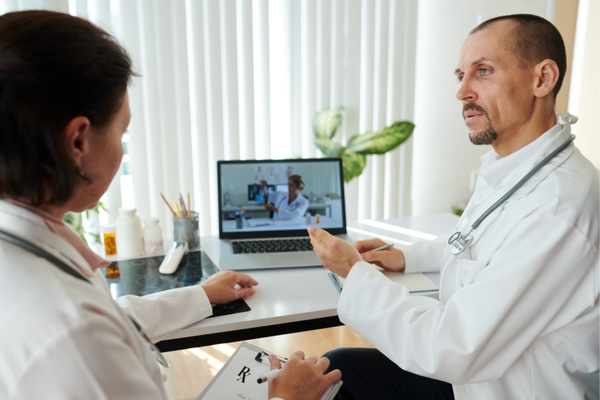
I didn’t have anything either. I knew I liked it, and I knew I wanted to get into it. When you have that drive, it’s a lot easier to learn something when you’re motivated to learn it. A lot of it, too, is experience. They could have had more business classes in school. That would’ve helped us, but I don’t know how much it would because with a lot of it, you have to get in there. Every situation is different. You have to learn on the job.
Thank you very much.
—
That’s it for part one of the full episode, the interview, plus the Q&A. I hope you guys enjoyed that whole episode, plus the Q&A. Stay tuned for part two of the full episode and the Q&A following that episode as well. We’ll see you guys then.
Important Links
- Tsawwassen Optometry
- [email protected]
- Mishe Optometry
- @MisheOptometry on Instagram
- Dr. Harbir Sian on YouTube
- Long Walk to Freedom: The Autobiography of Nelson Mandela
About Dr. Sara Kirby
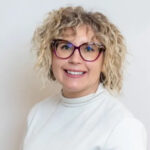
Dr. Sara Kirby, originally from Airdrie, Alberta, earned her Bachelor of Science in Nutrition from the University of Alberta before obtaining her Doctorate of Optometry from Pacific University. She joined Tsawwassen Optometry Clinic in 2012 and became a partner in 2014. Dr. Kirby is dedicated to providing comprehensive eye care to patients of all ages, with a particular focus on the elderly and children.
Her professional interests include contact lenses and ocular disease. Dr. Kirby is committed to humanitarian efforts, having participated in eye care mission trips to Ecuador, Peru and El Salvador, where she provided essential eye exams and glasses to those in need. In her personal time, she enjoys an active lifestyle with her husband and three children. Dr. Kirby is also deeply involved in various community projects and organizations, reflecting her dedication to both her patients and her community.
About Dr. Michelle Mann

Dr. Mann was born and raised in Surrey and attended Simon Fraser University where she completed her BSc in Health Science. After undergrad, she then went to MCPHS University in Massachusetts to study optometry where she completed a dual degree in Optometry and Masters of Public Health. Shortly after graduating, she decided to open her own clinic in her hometown called Mishe Optometry which celebrated 3 years this year!
When Dr. Mann is not busy running her practice, she sits on various committees in the Fraser Valley which include Langley Hospital Foundation, BC Cancer, and Options Community Services. Some of Dr. Mann’s hobbies include playing soccer, training for marathons, and overall, living a healthy lifestyle.
